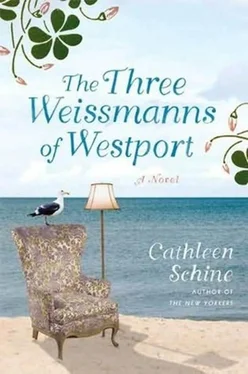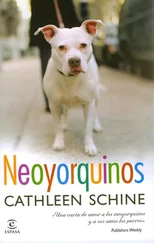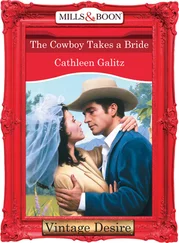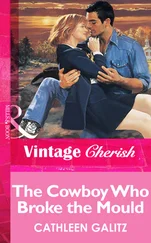She left them, and Kit watched her go, trying to ignore her tight, quick, sexy walk. When she returned, she was carrying a plate of cookies in one hand and the pants and sweater he'd lent her the day before in the other.
"This is the only tribute I have to pay at the moment," she said.
They sat on the wicker furniture in the sunporch and watched Henry eat cookies.
"He's two," Kit said. "His mother…"
Miranda was suddenly alert. His mother was… institutionalized? Dead? She felt a confession coming, a story, a tale of misery transcended…
"His mother is in Africa doing research for two months. It wouldn't have been safe to take him. She's an epidemiologist."
The child sat down heavily on the floor, then popped up and spun around, his arms out, his fingers splayed.
"We're divorced," Kit added.
She saw him blush. Or was she the one who blushed?
"So I've got him all to myself for a bit, don't I, little guy?" Kit continued quickly. "With a little help from Aunt Charlotte and her indomitable housekeeper, Hilda. Who might as well be named Mrs. Danvers. Henry, what does Hilda say?"
"'No, no, no,'" said Henry, shaking his finger.
He then ran from one end of the room to the other and came to a sudden stop in front of where Miranda sat.
He climbed into her lap and held a soggy, ragged remnant of a cookie up to her mouth.
Miranda felt the cookie on her lips, like damp, sweet sand. An oatmeal cookie. When they were children, they called oatmeal cookies "Josie cookies." She could not remember why. She looked at the big pale gray eyes of the child. His mouth was crusted with cookie detritus. His nails, dug into the cookie, seemed no bigger than five little kernels of corn. She nibbled at the cookie and saw his face light up and held him, suddenly, close to her breast.
"Thank you," she said softly. "Thank you, little Henry."
When Kit was strapping Henry into his car seat, he was aware of Miranda behind him. He turned and saw her, those remarkable eyes aimed right at him.
"I owe you," she said.
He shook his head, all the time watching her watch him. She took his hand. He heard himself suck in his breath, stirred, and wondered if she heard it, too. She was far too old for him, though he suddenly could not tell how old that actually was. Nor, he realized, did he care. He had fished her out of the sea. He could still feel the weight of her wet body. He quickly turned back to Henry. There was something depraved about even thinking of such things in front of one's son. And yet one did. The sky had cleared overnight, and the late-summer sunlight was deep and slanted and warm. She was wearing some kind of scent. Henry was kicking his feet against the car seat. Bing bang, bing bang.
"You have paid your debt with cookies," he said.
"No, no. Here's what I'll do," she said. "I'll take you out to dinner."
Her voice was low and straightforward. She was clearly used to people doing what she told them to do. He wanted to do what she wanted him to do.
Henry was singing now. Something from a cartoon show. Kit said, "Henry, say goodbye to Miranda."
An obliging child, Henry waved his small hand. He called her Randa, and she smiled and waved back.
"Tomorrow at seven," she said to Kit. "Pick me up here."
He nodded, watching her walk back toward the dreary little house.
"And," she added, turning around and flashing her smile, "make sure to bring your friend."
The Weissmanns sat, all three together, in the little living room. It was the cocktail hour, a sacred ritual held over from the days of Joseph.
"Look at the size of this baby," Betty said proudly, holding up an enormous vessel, a glass bottle of vodka the size of a Kentucky jug. "Costco is a destitute widow's dream."
"You spent over a thousand dollars there," Annie said. They all glanced at a newly installed hearth in which a ventless gas fire danced merrily.
"I miss the fireplace ladies," Miranda said.
"We are the fireplace ladies now," said Betty with a brave smile she had noticed in the mirror that morning and decided to keep.
Annie got up to set the table.
"Don't forget. Set an extra place," Miranda said. "Two places."
"The boys!" Betty said, as if Kit and Henry were brothers, were Annie's children. "I bought ice cream."
It was hard to think of Kit as anything but a boy. He seemed to be a very good father, warm and loving, gentle and firm when Henry behaved badly, appreciative the rest of the time. He had the patience of a saint-or a babysitter, Betty thought. There was something easygoing and relaxed about the young man that was extremely charming, but was a grown man with a young son supposed to be so at peace? Betty remembered when she first married Joseph. Annie had been almost as young as Henry. Joseph had not spent all his time playing with the girls. He had been at work, and when he was home, he had agonized about work. Joseph wanted to build a future for his family. That's what he told her at night when they lay in bed, arms around each other, dreaming of all the good things that would someday come their way. Well, Betty thought, here we are in the future, and what good did all of Joseph's planning and concern do them? Perhaps Kit's way was better. The child was his chum, his companion, his "little buddy." He always had time for him, except for those occasions when he had to go into the city for an audition. He was an actor, so he never had any work. He did always seem to have plenty of money, however, taking Miranda out to extravagant restaurants and appearing at the cottage with expensive bottles of wine. Perhaps Kit's way was better, Betty repeated to herself. Yet it was hard to accept him as an adult person. He was so intensely boyish, as if not the theater but being boyish were his profession. He seemed to have sprung from Henry's loins rather than the other way around.
Kit had taken Miranda sailing that morning. She had never sailed much before, but in the last month, Kit had taken her out almost every morning. She preferred sports that actually allowed you to move, like tennis or skiing or, in a pinch, golf. But sitting next to Kit on his Aunt Charlotte's sailboat, his unconscious youth illuminated in the rich autumn light, his skin burnt by the sun and the wind, his pale gray eyes squinting into the benign autumn sun, the sail full and bleached white against the richness of the sky, snapping in the wind, the clouds racing the sailboat across the blue expanse, sitting beside Kit, the sky so deep a blue and so alive on her skin, sitting there, so still, not moving a muscle, yet shooting through the waves, the spray cold and fine, Miranda had rediscovered the joy of speed.
This was not the same as movement, a sensation she knew so well, a sensation she needed and cultivated constantly, clapping her hands, waving her arms, striding purposefully across a room, standing, sitting, crossing and uncrossing her legs. Movement was a language Miranda could speak. But this was something entirely different. This was a rush of excitement, this was the universe's movement, not her own, this was beyond her control. For the first time in years, Miranda was passive, flying through time, hurtling toward her fate, whatever that fate might be.
Henry had been there, too, of course, on all the sails, swaddled in a fat yellow life preserver. That morning he had spent most of the time on Miranda's lap asleep. When he woke, he pointed at an airplane, at a seagull, at a plastic bleach bottle bobbing in the water, naming them as God named the birds and beasts of the Bible: plane, bird, bottle. Children are not very discriminating, she thought, seeing his gleeful eyes, and wondered where she fit into his interests. When he asked her to sing a song, she could think of nothing but "Puff the Magic Dragon." But when she got to the part about Little Jackie Paper going away, Henry began to sob.
Читать дальше












